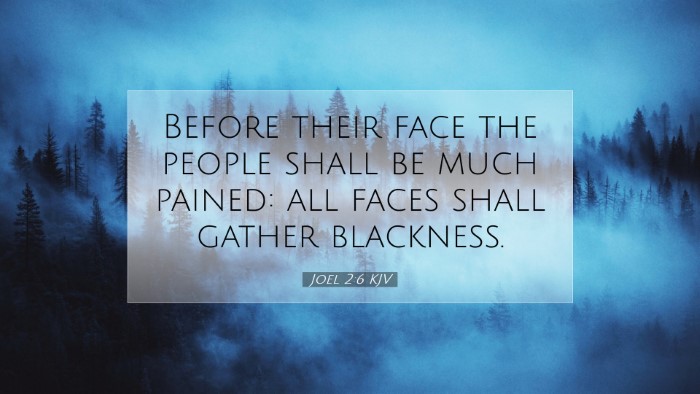Commentary on Joel 2:6
Verse: "Before them the peoples are in anguish; all faces grow pale." (Joel 2:6 ESV)
Contextual Overview
This verse is part of a larger prophecy attributed to the prophet Joel, concerning a great locust plague that symbolizes impending judgment and calamity upon the people of Israel. Joel speaks of a significant day of the Lord that heralds both destruction and the potential for renewal.
Interpretation of the Text
1. The Terrifying Approach of the Judgment:
In this context, Matthew Henry emphasizes that the destruction brought by the locusts is not merely agricultural but emblematic of a more significant judgment from God. The terror that these events instill in the people signifies a deeper spiritual disarray that accompanies divine judgment.
2. The Reaction of the People:
Albert Barnes notes that the phrase "all faces grow pale" indicates a universal reaction among the people. This physical manifestation of fear illustrates the psychological and spiritual state of those under God's impending judgment. The fear demonstrates their recognition of the severity of their situation.
3. Social and Spiritual Implications:
Adam Clarke delves into the social implications of this verse, highlighting how anguish spreads through communities as they confront the judgment of God. It serves as a sobering reminder of the collective guilt and the need for corporate repentance. The people’s anguish resonates deeply with their communal identity, reflecting the state of their covenant with God.
Examining the Historical Context
This prophecy was delivered during a time of great distress for Israel. The imagery of "peoples in anguish" parallels the devastation faced during the locust plague, symbolizing both a present crisis and foreshadowing greater eschatological events.
Significance of 'Peoples':
This term encompasses not just Israelites but also extends to nations surrounding them, which suggests that God's judgment is comprehensive. Matthew Henry comments on this broader scope, suggesting that God’s governance extends beyond Judah and highlights the universal accountability of all nations before Him.
Theological Implications
1. Fear of the Lord:
In biblical theology, the fear of the Lord is fundamental to the human relationship with God. The "pale faces" symbolize a lack of spiritual vitality among the people, indicating that they have lost sight of God’s holiness. Albert Barnes underscores that this reaction can serve as a precursor to true repentance if recognized correctly.
2. Divine Sovereignty:
The verse conveys a critical aspect of God’s sovereignty in both judgment and mercy. The locusts' advance is a manifestation of divine intent and serves as both a warning and an opportunity for the people to turn back to God. Adam Clarke points out that God uses calamity to evoke repentance, showcasing divine mercy even amid severe judgments.
Pastoral Application
For pastors and spiritual leaders, this verse offers a profound opportunity for teaching about the reality of God’s judgment balanced with His mercy. Reflecting on people's fear in the context of sin helps guide congregational teaching towards understanding the need for holiness and repentance.
1. Addressing Fear:
Leaders may encourage church members to channel this natural fear into a healthy reverence for God, reminding them of God’s character as righteous and just, but also loving and forgiving.
2. Encouraging Community Repentance:
This verse invokes the necessity for corporate repentance. Pastors can help foster a collective spirit of prayer and repentance within their congregations, urging members to seek restoration in their relationships with God and one another.
Conclusion
Joel 2:6 serves as a compelling reminder of the seriousness of sin and the profound effects of divine judgment — invoking anguish in the hearts of the people. By integrating the insights of biblical scholars and commentators, profound lessons can be drawn on the themes of judgment, repentance, and the expectation of God's mercy. It is vital for scholars, theologians, and students to comprehend the weight this verse carries in its historical context and its continuing relevance in today's society.


